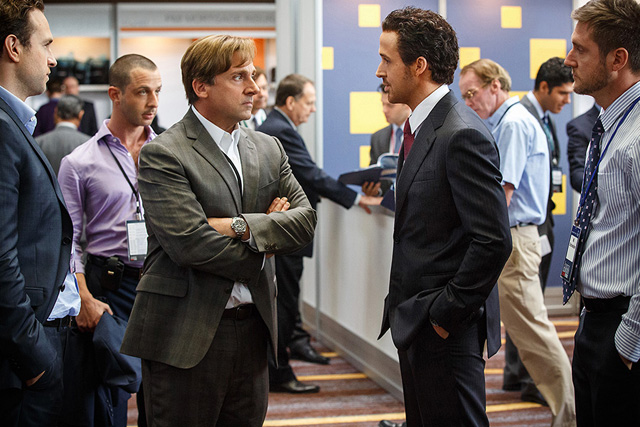Vice-Squad
Bizarro hedge-fund manager Michael Burry (Christian Bale) creates credit-default swaps and hangs tight when investors in his fund see their money disappearing before the bubble bursts. Deutsche Bank trader Jared Vennett (Ryan Gosling) and de facto partner Mark Baum (Steve Carell) figure out the risk to the whole economy that this bubble created, thanks to collateralized debt obligations that have grown much larger than the thing being securitized. Boulder, Colorado garage investors Charlie Geller and Jamie Shipley (John Magaro and Finn Whitrock), who get in on the action thanks to former Smartest Guy in the Room Ben Rickert (Brad Pitt), decide to blow the whistle when a disgusted Pitt reminds them that their cashing in requires the economy to collapse. The economy collapses. Nobody goes to jail.
Did that make sense? Right at the start of a review? It sure didn’t when they acted it out in Adam McKay’s The Big Short. So McKay builds in fourth-wall-breaking interjections that help the viewer out.
In an early scene, for example, narrator Gosling notes that the audience may not understand all the Wall Street terminology the characters are tossing around. “Does it make you feel bored or stupid?” he asks, and then says he has a novel solution, which turns out to be Margot Robbie in a bubble bath. The Australian actress addresses the camera and explains what subprime mortgages are. In between, she blows the bath foam around, sips champagne from a flute, and luxuriates in the aura of being one of the most gorgeous women in the world. “You got all that?” she asks at the end of her explanation. “Now fuck off.”
The Big Short is an acclaimed movie, scoring 87 percent “fresh” at Rotten Tomatoes, and that scene (along with other cameos featuring Anthony Bourdain with some fish and Selena Gomez playing blackjack) is often singled out for praise. It is funny, or at least entertaining in an absurdist way. And rhetorically brilliant as a counterpoint in style to the movie’s main flow.
But it also embodies what is wrong, very wrong, with the movie as a whole. Robbie explains that Wall Streeters love to use jargon so you’ll get confused, not notice what they’re doing, and feel obliged to trust them. “Or better yet, leave them alone,” she says with the wicked grin of someone letting you in on a naughty secret. Now you, the viewer, are one of the in-crowd.
But not really. What several movie critics have said—that this film de-obscures the 2008 financial crisis—isn’t true. The Big Short is tough to follow unless you already understand investment banking. (I largely do not, but that makes my un-de-obscuring relevant.) I left Oliver Stone’s Wall Street (1987) thinking I at least understood what had gone on; that wasn’t the case here.
The above-mentioned characters see things happen, and make things happen, but they don’t have a whole lot to do with one other. The Big Short reminded me, in this respect, of Syriana (2005) and The Thick of It (2005), both of which lost control of their sprawling stories. The market collapses of 2007-2008 were really really really complicated, with lots of blame to go around. But in lieu of absorbing the many intricacies and details as they accumulate, the audience is offered thematic flashcards now and again, bearing the oversimplification that it naturally prefers: the Greed of Them!
The three biggest stars give performances that can only be called ghastly. Carell’s first scene involves a Bernie Sanders-like rant about banks being all about “how can you screw working people.” He’s referring to overdraft rules. It’s about as convincing, in an investment banker, as a pacifist boxer (but very good as an early flashcard). Carell also wears a perpetual “Are you effing-kidding-me” sneer, with his lips curled more than Shirley Temple’s hair. It’s like watching Oscar the Grouch, played straight.
Bale overacts similarly, albeit in a different register—Attention Deficit Disorder and tics and the loudest silences you’ve seen since his Oscar-winning performance in The Fighter (2010), but without a character, a context, or a brother to play off of like he had in that film.
And then there’s Pitt, a co-producer of the film, essentially reprising his 12 Years a Slave (2013) role as The Cameo Voice of Moral Rectitude. Here he’s a disgruntled now-hippie hiding behind a beard and glasses; he of course manages to save the day for his two underlings.
Pitt’s homiletic performance and role point to the central flaw in The Big Short, especially when combined with the Robbie explanation that Wall Street wants to snow you. Hollywood movies have their own ways of achieving the same effects as Wall Street does — that is to say, hoping to make you feel mentally obliged to trust them. And this parallelism is something the film structurally can’t acknowledge . . . not without undermining the homiletics.
One such way is comedy. Indeed, a smirking glibness plagues The Big Short and most of its efforts at comedy, especially in its incredibly fast montages, often surrounding Bale and his email lists and phone calls and heavy-metal music on the earphones. Typical of today’s Cuisinart editing styles, the movie montages don’t give you time to register what the images are about as they flash by, but do let you react (force you, in fact) as mere and pure sensation.
Another is glamor, which can hide a lot of sloppy thought behind the face of Margot Robbie. She says, and others repeat the refrain throughout, that “the housing market is filled with bad loans.” Okay, but did you notice what got elided by the passive voice? At the risk of sounding like the little boy who wants to know what the turtle is standing on, why did banks make the bad loans in the first place? One shouldn’t so much wonder why bad loans got bundled into securities, and then credit-default swaps, but why these bad loans even existed to be bundled. The first lender makes loans on the expectation of getting paid back, so there wouldn’t seem to be an obvious answer. And because a borrower has legal and moral obligations to pay a loan back, he has some derivative obligation not to take out a loan he can’t pay back. Doesn’t he?
My gosh, it’s almost as if The Big Short doesn’t want you to think about the whole housing market and how it reached that perilous state. Might the government have inflated the housing bubble, imposed affordable housing mandates on Fannie Mae and Freddie Mac (proper nouns that may … may … have been mentioned twice in the movie), or encouraged looser standards for taking out a mortgage? Might people have gotten mortgages they couldn’t handle based on these absurdly weak criteria? (See Brian Domitrovic’s recent post on this site, which lays out what happened.) Actually, there is mention of looser underwriting standards in The Big Short. But it’s in the context of the film’s two sequences that take place outside of financial institutions — an investigative trip to Florida to take the pulse of the real-estate market (“Is there a bubble?”) and a journey to Las Vegas for a securitization conference.
The former sequence shows us a minority family who, it’s specified, are paying the rent but the (unseen) landlord isn’t paying the mortgage. They’re the only actual home-dwellers in The Big Short, a most conveniently chosen case. We also see a stripper whose time Steve Carell rents so she can get all sexy and strippery while the 40-year-old virgin tries to ask her about her adjustable-rate mortgage that is about to “adjust” to levels she can’t pay. He learns she has five mortgages and a condo. While her case isn’t as heavy on the pathos as the family (whom we later see living out of their car), she is also specifically set up as a victim of the local white-bro bankers who brag, one character disapprovingly notes, about what easy marks immigrants and strippers are. The former are easy to bamboozle and the latter prefer to operate on a cash basis, the bros boorishly boast.
The social-justice-warrior disapproval really starts to pick up steam with the securitization conference in Las Vegas, which is described as what would happen if “someone had a piñata full of white people who suck at golf.” There’s even a sudden cut from a scowling Carell to, of all things, a gun range, where bros from Central Casting fire Uzis at Osama bin Laden targets. They even bump chests to celebrate successes, fercryinoutloud.
The villainy is summed up at movie’s end, with the declaration that the country got over the housing crisis in its “usual” fashion—not by jailing the bankers lol (on what criminal charges, fastidious rule-of-law sticklers might wonder in the face of the mob), but by “blaming immigrants and poor people” as usual, plus teachers this time, in an aside.
That line shows the film’s real concern isn’t economics or history, but scapegoating. It’s as if Adam McKay knows that people don’t judge based on the facts, but on what seems authoritative and familiar. But Margot Robbie is hot. And that bubble-bath scene is funny. And white bros are jerks, amirite!!
You got all that? Now fuck off.



